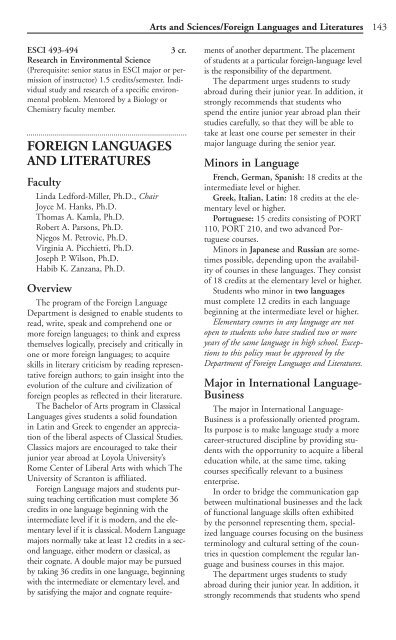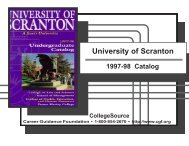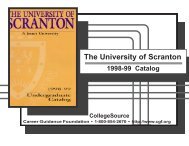2003-2004 - The University of Scranton
2003-2004 - The University of Scranton
2003-2004 - The University of Scranton
You also want an ePaper? Increase the reach of your titles
YUMPU automatically turns print PDFs into web optimized ePapers that Google loves.
ESCI 493-494 3 cr.<br />
Research in Environmental Science<br />
(Prerequisite: senior status in ESCI major or permission<br />
<strong>of</strong> instructor) 1.5 credits/semester. Individual<br />
study and research <strong>of</strong> a specific environmental<br />
problem. Mentored by a Biology or<br />
Chemistry faculty member.<br />
FOREIGN LANGUAGES<br />
AND LITERATURES<br />
Faculty<br />
Linda Ledford-Miller, Ph.D., Chair<br />
Joyce M. Hanks, Ph.D.<br />
Thomas A. Kamla, Ph.D.<br />
Robert A. Parsons, Ph.D.<br />
Njegos M. Petrovic, Ph.D.<br />
Virginia A. Picchietti, Ph.D.<br />
Joseph P. Wilson, Ph.D.<br />
Habib K. Zanzana, Ph.D.<br />
Overview<br />
<strong>The</strong> program <strong>of</strong> the Foreign Language<br />
Department is designed to enable students to<br />
read, write, speak and comprehend one or<br />
more foreign languages; to think and express<br />
themselves logically, precisely and critically in<br />
one or more foreign languages; to acquire<br />
skills in literary criticism by reading representative<br />
foreign authors; to gain insight into the<br />
evolution <strong>of</strong> the culture and civilization <strong>of</strong><br />
foreign peoples as reflected in their literature.<br />
<strong>The</strong> Bachelor <strong>of</strong> Arts program in Classical<br />
Languages gives students a solid foundation<br />
in Latin and Greek to engender an appreciation<br />
<strong>of</strong> the liberal aspects <strong>of</strong> Classical Studies.<br />
Classics majors are encouraged to take their<br />
junior year abroad at Loyola <strong>University</strong>’s<br />
Rome Center <strong>of</strong> Liberal Arts with which <strong>The</strong><br />
<strong>University</strong> <strong>of</strong> <strong>Scranton</strong> is affiliated.<br />
Foreign Language majors and students pursuing<br />
teaching certification must complete 36<br />
credits in one language beginning with the<br />
intermediate level if it is modern, and the elementary<br />
level if it is classical. Modern Language<br />
majors normally take at least 12 credits in a second<br />
language, either modern or classical, as<br />
their cognate. A double major may be pursued<br />
by taking 36 credits in one language, beginning<br />
with the intermediate or elementary level, and<br />
by satisfying the major and cognate require-<br />
Arts and Sciences/Foreign Languages and Literatures 143<br />
ments <strong>of</strong> another department. <strong>The</strong> placement<br />
<strong>of</strong> students at a particular foreign-language level<br />
is the responsibility <strong>of</strong> the department.<br />
<strong>The</strong> department urges students to study<br />
abroad during their junior year. In addition, it<br />
strongly recommends that students who<br />
spend the entire junior year abroad plan their<br />
studies carefully, so that they will be able to<br />
take at least one course per semester in their<br />
major language during the senior year.<br />
Minors in Language<br />
French, German, Spanish: 18 credits at the<br />
intermediate level or higher.<br />
Greek, Italian, Latin: 18 credits at the elementary<br />
level or higher.<br />
Portuguese: 15 credits consisting <strong>of</strong> PORT<br />
110, PORT 210, and two advanced Portuguese<br />
courses.<br />
Minors in Japanese and Russian are sometimes<br />
possible, depending upon the availability<br />
<strong>of</strong> courses in these languages. <strong>The</strong>y consist<br />
<strong>of</strong> 18 credits at the elementary level or higher.<br />
Students who minor in two languages<br />
must complete 12 credits in each language<br />
beginning at the intermediate level or higher.<br />
Elementary courses in any language are not<br />
open to students who have studied two or more<br />
years <strong>of</strong> the same language in high school. Exceptions<br />
to this policy must be approved by the<br />
Department <strong>of</strong> Foreign Languages and Literatures.<br />
Major in International Language-<br />
Business<br />
<strong>The</strong> major in International Language-<br />
Business is a pr<strong>of</strong>essionally oriented program.<br />
Its purpose is to make language study a more<br />
career-structured discipline by providing students<br />
with the opportunity to acquire a liberal<br />
education while, at the same time, taking<br />
courses specifically relevant to a business<br />
enterprise.<br />
In order to bridge the communication gap<br />
between multinational businesses and the lack<br />
<strong>of</strong> functional language skills <strong>of</strong>ten exhibited<br />
by the personnel representing them, specialized<br />
language courses focusing on the business<br />
terminology and cultural setting <strong>of</strong> the countries<br />
in question complement the regular language<br />
and business courses in this major.<br />
<strong>The</strong> department urges students to study<br />
abroad during their junior year. In addition, it<br />
strongly recommends that students who spend
















